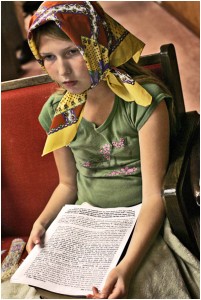I was reading your article on Rick Warren and noticed the quote of 1 Timothy2:8-12. Why aren’t the women in this church silent? Also, why do some of the women, including Margie Phelps, wear pearls in
public?
Oy vey, Linda!
You’re asking the wrong questions, my dear. No worries, I’ll try to help you!
Let’s first identify those verses (with context) that you’re trying to misunderstand:
“I will therefore that men pray every where, lifting up holy hands, without wrath and doubting. ¶ In like manner also, that women adorn themselves in modest apparel, with shamefacedness and sobriety; not with broided hair, or gold, or pearls, or costly array; But (which becometh women professing godliness) with good works. Let the woman learn in silence with all subjection. But I suffer not a woman to teach, nor to usurp authority over the man, but to be in silence.” 1 Timothy 2:8-12.
Now let’s consider what authoritative expositors have written to help us understand (those expositors that have researched the different translations, rabbis’ commentary, the talmud & other early expositors – all exhaustively); let’s go with my friend John Gill (1697-1771).
On the subject of the pearls, etc. in verse 9, John Gill says this passage refers to public worship (during the church meeting); here is his verbatim text – I’ll put in bold those parts to pay close attention to:
“Ver. 9. In like manner also, &c.] Let the women pray likewise; though they are not to lead in prayer, or be the mouth of the church, which would be indecent, yet they are to join with the church in public prayer; see #Ac 1:14 and in like manner as the men, with purity of heart and hand, without murmuring and impatience towards God, and without wrath and anger towards others, and in faith, without doubting and distrust: and the apostle proceeds to point out what sort of dress he would have them appear in at the time of prayer, and at any part of public worship; and thus the Ethiopic version renders it, “so let the women be clothed in prayer,” namely, as follows;
that women adorn themselves in modest apparel: the word rendered “apparel” signifies a long robe, which reaches down to the feet; and the word translated “modest” signifies that which is clean, neat, and decent, yea,
beautiful and ornamental; and the sense of the apostle is, that he would not have them to come to public worship in rags, and in dirty and filthy garments, but that their bodies should be covered with clean and decent raiment; so the Israelites washed their clothes that they might be ready to meet the Lord at Mount Sinai, #Ex 19:14. The Jews always appeared in their best clothes on the sabbath day; this is one of their rules: {n}
“for the honour of the sabbath, every man must be clothed, כסות נקייה, “with clean or neat apparel” and clothing on the weekday must not be as clothing on the sabbath day; and if a man can make no change, he must let down his talith (or upper garment, his cloak); so that his clothing may not be as the clothing of the weekdays, when that was girt up about him.”
The apostle adds,
with shamefacedness and sobriety: these are the two general rules by which dress is to be regulated; it is right and proper, when it is consistent with chastity, when it is not immodest and impudent, and more like the attire of an harlot than of a woman professing godliness; and when it is moderate as well as modest, and suitable to a person’s age and station, and is not beyond the circumstances of life in which
they are. There is no religion or irreligion in dress, provided pride and luxury are guarded against, and modesty and moderation preserved.
Not with broidered hair, or plaited, as in #1Pe 3:3, see Gill on “1Pe 3:3″. The Jews had women on purpose for this business; Mary Magdalene is thought to have her name from hence; see Gill on “Mt 27:56″. Or gold, or pearls, or costly array: not that the apostle forbids all use or wear of such things by proper persons, whose
circumstances would admit of it, and upon proper occasions, and at proper times: certain it is, that earrings and bracelets of gold, and jewels set in silver and gold, and raiment, costly raiment, were sent by Abraham, and given to Rebekah, and wore by her, who was a woman professing godliness so the church in #Ps 45:9,13,14 though in figurative expressions, yet in allusion to what is literal, and honourable, and commendable, is said to be in gold of Ophir, and her clothing to be of wrought gold, and to be brought to the king in raiment of needlework: but however justifiable such a dress may be at other seasons, the apostle judged it very improper at the time of public prayer, or at the time of public worship; seeing it might swell the heart of the wearer with pride, so as to forget herself and the business she was come about, and draw the eyes of others upon her; and so cause a general inattention. It was a complaint of Chrysostom’s many hundreds
of years ago, that some who came to public worship, appeared in such a dress, as if they came rather to dance than to pray; such apparel should be avoided: it is said of Pythagoras {o}, that he taught the inhabitants of Crotona, the men literature, and the women chastity and modesty; and by his disputations so far prevailed upon the latter, as to lay aside their garments of gold and other ornaments of their dignity, as instruments of luxury; all which they brought into the temple of Juno, and dedicated them to that goddess; declaring, that
shamefacedness or chastity, and not garments, are the true ornaments of matrons.”
Now, let’s go to verses 11 & 12 and see what John Gill has to offer on that verse (keeping in mind this passage refers to how women ought to be during the church service):
“Ver. 11. Let the woman learn in silence, &c.] The apostle goes on to give some other instructions to women, how they should behave themselves in public worship, in the church of God; he would have them be learners and not teachers, sit and hear, and learn more of Christ, and of the truth of the Gospel, and to maintain good works; and he would have them learn in silence, and not offer to rise and speak, under a pretence of having a word from the Lord, or of being under an impulse of the Spirit of the Lord, as some frantic women have done; and if they should meet with anything, under the ministry of the word, they did not understand, or they had an objection to, they were not to speak in public, but ask their own husbands at
home; see #1Co 14:34,35. And thus, they were to behave
with all subjection; both to the ministers of the word, and to their own husbands; obeying from the heart the form of doctrine delivered to them; and submitting cheerfully to the ordinances of Christ; the whole of which is a professed subjection to the Gospel, and which becomes all professing godliness.
Ver. 12. But I suffer not a woman to teach, &c,] They may teach in private, in their own houses and families; they are to be teachers of good things, #Tit 2:3. They are to bring up their children in the nurture and admonition of the Lord; nor is the law or doctrine of a mother to be forsaken, any more than the instruction
of a father; see #Pr 1:8 31:1-4. Timothy, no doubt, received much advantage, from the private teachings and instructions of his mother Eunice, and grandmother Lois; but then women are not to teach in the church; for that is an act of power and authority, and supposes the persons that teach to be of a superior degree, and in a superior office, and to have superior abilities to those who are taught by them:
nor to usurp authority over the man; as not in civil and political things, or in things relating to civil government; and in things domestic, or the affairs of the family; so not in things ecclesiastical, or what relate to the church and government of it; for one part of rule is to feed the church with knowledge and understanding; and for a woman to take upon her to do this, is to usurp an authority over the man: this therefore she ought not to do,
but to be in silence; to sit and hear quietly and silently, and learn, and not teach, as in #1Ti 2:11.”
Linda, if one or more members of the Westboro Baptist Church do not obey these plain rules (however much you may try to willfully misunderstand them), that is unacceptable conduct which must be remedied at once for the sake of the person(s) and most importantly for the health of the church of the Lord Jesus Christ, the Westboro Baptist Church today.
So, I think you meant to ask, “What does 1 Timothy 2:8-12 mean, especially the part about wearing pearls & women being silent?” – & I hope the above answer helps you.
Thank you,
Member of WBC

